- Home
- William Maxwell
Time Will Darken It Page 2
Time Will Darken It Read online
Page 2
Such continuous open hospitality was dying out; it was a thing of the past. Martha King didn’t entertain easily and casually the way Austin’s mother had, and also, two days before the letter came, Dr. Seymour had told her that she was pregnant again. Faced with a choice between an inherited obligation and the consideration he owed his wife, Austin had sat down at his desk and tried to frame a letter that would explain, politely and regretfully and without giving offence, why it was not convenient to have the Potters at this time. He began and crumpled up one draft after another, until finally, trusting that Martha out of love for him would understand and approve, he dipped his pen in the ink bottle and with a heavy sigh committed them both.
Martha King not only didn’t understand, she put an altogether different colouring upon his intentions; but instead of telling him how she felt, she waited, and when the Potters had arrived and it was too late for him to do anything about it, she made a scene behind the closed bedroom door, showered him with accusations (some just, some unjust), said that he didn’t love her or he couldn’t possibly have done such a thing when she was in no condition to have a house full of company, and then withdrew her support, leaving him to manage as best he could. To add to Austin’s difficulties, she was ill in a way that she hadn’t been before Ab was born; she was subject to morning sickness, making him feel that he had been unfair not only towards her but also towards the Potters, who should have been told, he now realized. They should at least have been given a chance not to come.
The footsteps stopped.
“Will there be any children for me to play with?” Ab asked.
Austin said, “No, this is a grown-up party and you mustn’t interrupt people when they are talking, do you hear? Just be quiet and watch, and afterwards everybody will say, ‘What a nice little girl.’ ”
He gave his daughter a pat on the behind and then, stepping over a doll’s bed and a house of alphabet blocks, left her and went back into the bedroom across the hall.
2
Elm Street, the street the Kings lived on, had been finished for almost a generation when the Potters arrived for their visit. The shade had encroached gradually upon the areas of sunlight, and the outermost branches of the trees—maples and elms, cottonwoods, lindens and box elders—had managed to meet in places over the brick pavement. The houses reflected no set style or period of architecture, but only a pleasure in circular bay windows, wide porches, carpenter’s lace, and fresh white paint. Elm Street led nowhere in particular and there was never much traffic on it. The most exciting vehicle that passed on a summer day was the ice-cream wagon, painted white, its slow progress announced by a silvery ka-ling, ka-ling, ka-ling that brought children running to the kerb. The ice-cream wagon was the high point of the monumental July or August afternoon, and much of its importance came from the fact that it was undependable. The children often waited for it in vain, their only consolation the chips that fell from the iceman’s pick. There were also gypsy wagons, but they were infrequent, not to be expected more than once or twice a summer. When they did come, the smaller children, clutching their playthings, withdrew to their own front porches where, in safety, they stood and stared until the caravan of five or six covered wagons had passed by.
For a street only three unbroken blocks long—Elm Street below the intersection was another world entirely—there were an unusual number of children and it was they who gave the street its active character and its air of Roman imperishability. In feature and voice and attitude they were small copies of the women who shook dustcloths out of upstairs windows and banged mops on porch railings, of the men who came home from work in the late afternoon and stood in their shirt-sleeves dampening the lawns and flower beds with a garden hose. But for a time, for as long as they were children, they were almost as free as the sparrows.
With two alleys and any number of barns, pigeon houses, chicken coops, woodsheds, and sloping cellar doors (all offering excellent hiding and sliding places to choose from, all in the public domain), the children seldom left the street to play.
In the daytime boys and girls played apart, but evening brought them all together in a common dislike of the dark and of their mother’s voice calling them home. They played games, some of which were older than Columbus’ voyages. They caught lightning bugs and put them in a bottle. They frightened themselves with ghost stories. They hid from and hunted one another, in and out of the shrubbery. For the grown people relaxing on their porches after the heat of the day, the cry of Ready or not you shall be caught was no more alarming than the fireflies or the creak of the porch swing.
Elm Street is now in its old age and nothing of all this is left. There are cars instead of carriages, no gypsy wagon has been seen in this part of the country for many years. The ice-cream wagon stopped being undependable and simply failed to come.
If you happen to be curious about the Indians of Venezuela, you can supply yourself with credentials from the Ministry of Education and letters from various oil companies to their representatives in field camps. With your personal belongings and scientific instruments, including excavating tools for, say, a crew of twelve men—with several hundred sugar bags for specimens, emergency food rations, mosquito netting, and other items essential for carrying on such archæological work—you can start digging and with luck unearth pottery and skeletons that have lain in the ground since somewhere around A.D. 1000. The very poverty of evidence will lead you to brilliant and far-reaching hypotheses.
To arrive at some idea of the culture of a certain street in a Middle Western small town shortly before the First World War, is a much more delicate undertaking. For one thing, there are no ruins to guide you. Though the houses are not kept up as well as they once were, they are still standing. Of certain barns and outbuildings that are gone (and with them trellises and trumpet vines) you will find no trace whatever. In every yard a dozen landmarks (here a lilac bush, there a sweet syringa) are missing. There is no telling what became of the hanging fern baskets with American flags in them or of all those red geraniums. The people who live on Elm Street now belong to a different civilization. They can tell you nothing. You will not need mosquito netting or emergency rations, and the only specimens you will find, possibly the only thing that will prove helpful to you, will be a glass marble or a locust shell split up the back and empty.
3
“If you want me to ask them to leave, I will,” Austin said, turning to the four-poster bed. “I’ll go right now and explain to them that it was all a mistake, and that we just aren’t in a position to have company at this time.”
To do this meant that he and the Potters would have to face each other in an embarrassment so hideous that he didn’t dare think about it. Nevertheless, if that was what she wanted, if he had put a greater burden on her than she could manage, then he was ready, at whatever cost to himself, to set her free.
“Seriously,” he said.
The offer was not accepted.
He turned away and opened the bottom drawer of the highboy, searching for summer underwear. “I’m going to take a bath and shave,” he said. “It’s almost five-thirty. Somebody has to be downstairs to let people in.” He went off down the hall.
Now is the time to be quiet, to stand patiently in this upstairs bedroom and wait for some change in the position of the woman on the bed. So far as a marriage is concerned, nothing that happens downstairs in the living-room or the dining-room or the kitchen is ever as important as what goes on behind the closed bedroom door. It is the point at which curious friends and anxious or interfering relatives have to turn away.
The big double bed, like the quilt, is an heirloom and possibly a hundred years old. At the top of each heavy square post there is a dangerous spike, intended to hold the huge canopy that is now in the Kings’ barn, gathering dust. The highboy, also of antique mahogany, contains a secret drawer in which (since Martha King had no secrets and Austin hid his elsewhere) are kept a velvet pincushion in the shape of a strawberry and odds and
ends of ribbon. Originally dark, the woodwork in this room has been painted white. The windows extend to the floor and are open to the slight stirring of air that blesses this side of the house, carrying with it the scent of petunias from the window-box. The ceiling of the bedroom is eleven feet high, indicating the house’s age and some previous history—quarrels between husband and wife, perhaps, in this very room.
After twenty minutes he came back and went over to the dressing-table. With his head bent forward so that the mirror would accommodate his reflection, he parted his damp hair solemnly on the left side and combed it flat against his skull. In sleep, in repose, in all unguarded moments, his face had a suggestion of sadness about it.
“Was it something that happened this afternoon?” he asked, standing beside the bed. “Did I do something or say something in front of them that hurt your feelings?”
With her voice half-smothered in the pillow Martha King said, “You didn’t do anything or say anything and my feelings are not hurt. Now will you please go away?”
He leaned across her, trying to see her face.
“And please don’t touch me!”
Austin had a sudden angry impulse to turn her over and slap her, but it was so faint and so immediately disowned that he himself was hardly aware of it. “Listen to me,” he said. “You’ve got to get up now and come downstairs. I don’t know what they’ll think if you——”
“I don’t care what they think. I’m not going downstairs.”
“You’ve got to. We have company in the house and you’ve asked all those people.”
“You go down if you want to. It’s your company.”
“But what’ll I tell them?”
“Whatever you feel like telling them. Tell them you’re married to an impossible woman who doesn’t care what she does or how much humiliation she brings upon you.”
“That isn’t true,” he said, in a tone of voice that carried only partial conviction—the intention to believe what he had just said, rather than belief itself.
“Yes it is, it’s all true and you know it! Tell them I’m lazy and extravagant and a bad housekeeper and that I don’t take proper care of my child!”
Austin’s eyes wandered to the clock on the dressing-table.
“Couldn’t we postpone this—this discussion until later? I know I said something that hurt your feelings but I didn’t mean to. Really I didn’t. I don’t know what it was, even.” Again the voice was not wholly convinced of what it said. “Tonight after the party, we’ll have it all out, everything. And in the meantime——”
“In the meantime I wish I were dead,” Martha King said, and rolled over on her back. Her face was flushed and creased from the pillow, and so given over to feeling that one part of him looked at it with curiosity and detachment. Beautiful (and dear to him) though her ordinary face was, in colouring and feature, in the extreme whiteness and softness of the skin and in the bone structure that lay under this whiteness and softness, and the bluish tint of the part of her eyes surrounding the brown iris, it was a beauty that was all known to him. He saw something now that he might not ever see again, an effort on the part of flesh to make a new face, stranger and more vulnerable than the other. And more beautiful. Tears formed in the right eye and spilled over, and then both eyes were blinded by them. The detachment gave way and he gathered her in his arms.
“I don’t see why you aren’t happy with me,” she said mournfully. “I try so hard to do everything the way you want me to do it.”
He wiped the tears away with his hand gently, but there were more. “I am happy,” he said. “I’m very happy.”
“You can’t be. Not as long as you’re married to a woman who gives you no peace.”
“But I am, I tell you. Why do I have to keep saying that I’m happy? If you’d only stop worrying about it and take things for granted, we’d never have these——Was it Nora Potter? Was it something about Nora?”
Martha shook her head.
“Sweetheart, Nora is like a cousin. She doesn’t mean anything more to me than that. You don’t have any cousins or you’d understand.”
“I saw you when you helped her out of the carriage. You were smiling at her, and I knew you liked her better than you do me. I knew it would happen, before ever they came, and I don’t know why I let it upset me. I just couldn’t bear it.” Now that she had at last accused him, she took his handkerchief and sat up and blew her nose.
“I don’t know what you’re talking about,” he said with a guilty smile, though he had never in his life been more innocent. “Nothing happened. I don’t remember smiling at her, or if I did—look, they invited themselves. I didn’t ask them to come, and if I’d known they would give you a moment’s unhappiness I’d never have allowed them to set foot in this house. You know that, don’t you? Now that they’re here, we might as well make the best of it. They won’t stay long, probably, and we’ll never have to have them again. We’ll just go on living the way we have been, the three of us, and be happy.”
So deeply did he mean and believe in this promise that the barricade of suspicion, the whole elaborate structure of jealousy and doubt that his wife had erected to keep him from reaching her, gave way before his eyes. The flesh gave up trying to make a new face and was content with the old one. Lightly, with the tips of her fingers, she stroked the fabric of his shirt. He took her in his arms again and rocked her.
Neither of them heard the steps on the front porch or the doorbell ringing in the pantry. With no sense of the passing of time, no anxiety because the guests had begun to arrive and there was no one downstairs to introduce the people from Mississippi, they held each other and lost themselves in the opening, unmasking tenderness that always comes after a satisfactory quarrel. At last, feeling utterly secure and able to cope with anything, Austin got up from the bed and finished dressing.
“I’ll go right down,” he said, “and tell them you were having trouble in the kitchen. Nobody will think anything about it.”
“Do I look as if I had been crying?” she asked.
“Hardly at all. Put a cold cloth on your eyes.”
At the door he took her in his arms once more and felt her cling to him. If he had held her a moment longer he would have given her all the reassurance she needed for some time to come, but he remembered the people downstairs, and let go. It was not his failure entirely. Women are never ready to let go of love at the point where men are satisfied and able to turn to something else. It is a fault of timing that affects the whole human race. There is no telling how much harm it has caused.
4
Rachel, the Kings’ coloured cook, heard the doorbell but Martha King had told her that she would be downstairs to let people in, and so, instead of hurrying through the front part of the house to answer it, she stood still and listened. Rachel never hurried, in any case, but set her course and let wind, wave, and tide take her where she had to go. Her daughter Thelma, who was twelve years old and had been got in to help, said, “They’re beginning to come.”
“All of them with big appetites,” Rachel said, and opened the oven door and basted the ham.
On the front porch, old Mrs. Beach and her two daughters waited. At this hour of the day Elm Street was deserted, its inhabitants drawn to the supper table like nails to a magnet.
“Do you think we should call out?” Alice Beach asked, after what began to seem rather a long time.
“If they’re downstairs they’ll come,” Mrs. Beach said. “And if they’re upstairs they wouldn’t hear us. Are we early?”
Lucy Beach glanced at the little gold watch that was attached to her shirtwaist by a fleur-de-lis pin, and said, “It’s five minutes after.”
“Perhaps we ought to go home,” Alice Beach said, “and come back later.” Though she was in her early forties, she looked to her mother to settle the matter.
“When I was a young married woman,” Mrs. Beach said, “and asked people for a certain hour, I was always ready to receive them. I hope when
you girls marry that you’ll remember to do the same. Not to receive your guests when they arrive is a mark of rudeness.” She turned majestically and started for the steps.
Reluctantly her daughters followed. They had looked forward to this evening and there was reason to fear that, once they got home, even though it was only next door, their mother would refuse to stir out of the house.
“Are you coming to the party?” a small voice asked, and the three women, startled, turned around and saw Ab peering at them through the screen door.
“We are if there’s going to be a party,” Mrs. Beach said.
“Oh yes,” Ab said.
“Well then, you’d better ask us in.”
They trailed into the house, left their crocheted bags and their white kid gloves on the hall table, and seated themselves in an alcove of the long living-room, which by its extreme order and high polish and glittering candlesticks and bouquets of white phlox seemed to support Ab’s statement. The little girl sat in a big wing chair facing Mrs. Beach.
“How are your dolls?” Alice Beach asked.
“They’re fine, all but Gwendolyn,” Ab said, after considering whether or not this interest was genuine, and deciding that it was.
“What’s the matter with Gwendolyn? She looked remarkably well the last time I saw her.”
“Oh, she broke,” Ab said vaguely.
“You must have played too roughly with her,” Mrs. Beach said. “I still have every doll that was ever given to me.”
“Could I see them some time?” Ab asked.
“They’re in the attic,” Mrs. Beach said with discouraging finality.
A considerable stretch of silence followed. The guests looked around expectantly and then at each other. Ab, with no basis of social comparison, found nothing strange either in the silence or in the expectancy. All the windows were open and also the French doors leading out onto the side porch, but even so, it was very warm in the living-room. Above the upright piano, in a heavy gilt frame, was an oil painting of the castle of St. Angelo. The clock in the clock tower was real, and its thin tick gradually dominated the silence and filled the room with tension.

 The Chateau
The Chateau Time Will Darken It Time Will Darken It
Time Will Darken It Time Will Darken It The Heavenly Tenants
The Heavenly Tenants They Came Like Swallows
They Came Like Swallows So Long, See You Tomorrow
So Long, See You Tomorrow The Folded Leaf
The Folded Leaf All the Days and Nights
All the Days and Nights Time Will Darken It
Time Will Darken It Ancestors
Ancestors